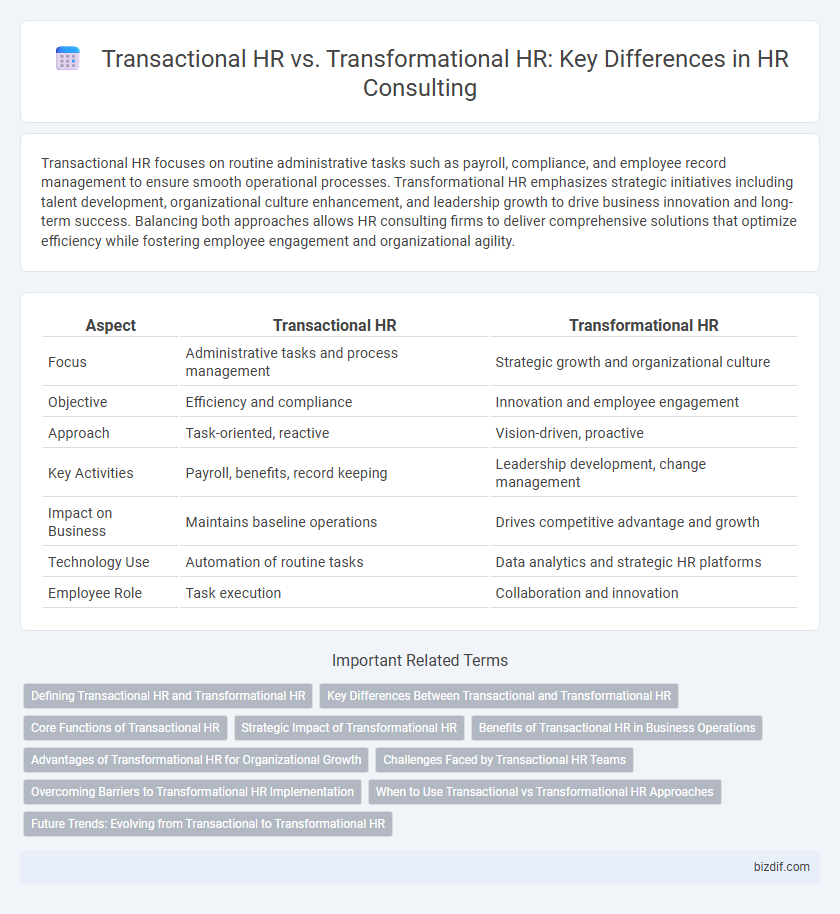Transactional HR focuses on routine administrative tasks such as payroll, compliance, and employee record management to ensure smooth operational processes. Transformational HR emphasizes strategic initiatives including talent development, organizational culture enhancement, and leadership growth to drive business innovation and long-term success. Balancing both approaches allows HR consulting firms to deliver comprehensive solutions that optimize efficiency while fostering employee engagement and organizational agility.
Table of Comparison
| Aspect | Transactional HR | Transformational HR |
|---|---|---|
| Focus | Administrative tasks and process management | Strategic growth and organizational culture |
| Objective | Efficiency and compliance | Innovation and employee engagement |
| Approach | Task-oriented, reactive | Vision-driven, proactive |
| Key Activities | Payroll, benefits, record keeping | Leadership development, change management |
| Impact on Business | Maintains baseline operations | Drives competitive advantage and growth |
| Technology Use | Automation of routine tasks | Data analytics and strategic HR platforms |
| Employee Role | Task execution | Collaboration and innovation |
Defining Transactional HR and Transformational HR
Transactional HR focuses on administrative tasks such as payroll, compliance, and employee record management to ensure smooth daily operations. Transformational HR emphasizes strategic initiatives like talent development, organizational culture, and leadership enhancement to drive long-term business growth. Both approaches are essential, with transactional HR maintaining operational efficiency and transformational HR fostering innovation and competitive advantage.
Key Differences Between Transactional and Transformational HR
Transactional HR focuses on routine administrative tasks such as payroll, compliance, and employee record management, ensuring operational efficiency and policy adherence. Transformational HR emphasizes strategic initiatives including leadership development, organizational culture change, and talent management to drive business growth and innovation. The key difference lies in transactional HR managing day-to-day functions while transformational HR aligns human resources with long-term organizational goals.
Core Functions of Transactional HR
Transactional HR focuses on core functions such as payroll processing, employee record management, benefits administration, and compliance with labor laws. These tasks ensure operational efficiency and accuracy in routine HR activities. By managing repetitive processes, Transactional HR supports the organization's foundational HR infrastructure.
Strategic Impact of Transformational HR
Transformational HR drives strategic impact by aligning human capital initiatives with long-term business goals, fostering organizational agility and innovation. This approach emphasizes leadership development, culture change, and employee engagement to create sustainable competitive advantage. Unlike transactional HR, which focuses on administrative tasks, transformational HR integrates talent management with strategic planning to enhance overall organizational performance.
Benefits of Transactional HR in Business Operations
Transactional HR streamlines routine administrative tasks such as payroll processing, compliance management, and employee record-keeping, ensuring operational efficiency and reducing errors in business operations. By maintaining clear policies and consistent procedures, transactional HR supports workforce stability and boosts productivity through reliable day-to-day management. This foundational approach allows businesses to allocate resources effectively while minimizing legal risks and administrative overhead.
Advantages of Transformational HR for Organizational Growth
Transformational HR drives organizational growth by fostering innovation, enhancing employee engagement, and developing leadership capabilities aligned with strategic goals. This approach promotes a culture of continuous learning and adaptability, which improves overall performance and agility in changing markets. By focusing on long-term development rather than routine administrative tasks, transformational HR creates a competitive advantage through empowered, motivated workforce.
Challenges Faced by Transactional HR Teams
Transactional HR teams often struggle with repetitive administrative tasks, leading to limited strategic impact and employee engagement. Their focus on compliance, payroll, and record-keeping creates bottlenecks that hinder innovation and adaptability in evolving organizational environments. These challenges highlight the need for integrating transformational HR practices to drive culture change, talent development, and long-term business value.
Overcoming Barriers to Transformational HR Implementation
Overcoming barriers to transformational HR implementation requires addressing organizational resistance, limited leadership buy-in, and insufficient technological infrastructure. Effective strategies include fostering a culture of continuous learning, aligning HR initiatives with strategic business goals, and investing in advanced HR analytics tools to enable data-driven decision-making. Building cross-functional collaboration and enhancing change management capabilities facilitate the shift from transactional HR processes to innovative, strategic HR practices.
When to Use Transactional vs Transformational HR Approaches
Transactional HR is best utilized for routine tasks such as payroll, compliance, and employee record management, ensuring operational efficiency and consistency. Transformational HR becomes essential during periods of organizational change, talent development, and culture transformation to drive innovation and employee engagement. Selecting the appropriate approach depends on the business goal--opt for transactional methods for stability and transactional accuracy, while transformational strategies support growth and long-term strategic alignment.
Future Trends: Evolving from Transactional to Transformational HR
Future trends in HR emphasize a shift from Transactional HR, which focuses on routine administrative tasks, to Transformational HR that drives strategic business growth through talent development and culture enhancement. Advanced AI and data analytics enable HR professionals to predict workforce needs, personalize employee experiences, and foster agile leadership. Embracing these innovations positions organizations to enhance employee engagement, improve decision-making, and sustain competitive advantage in a rapidly changing labor market.
Transactional HR vs Transformational HR Infographic

 bizdif.com
bizdif.com